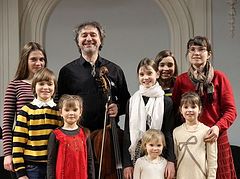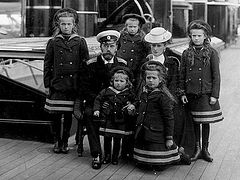In contemporary world intelligence, the accumulation of concepts, technical skills and all that is “mental”, is valued ever more highly. But even specialists have begun to express their concern, admitting that “the spiritual law” is above all else; it is the basis of all these abilities of ours, and we need to develop our emotions, feelings, relationships with other people—the realm of the “heart”.
In his book, Emotional Intelligence, Daniel Goleman collected the results of studies of intelligence conducted over several decades and concluded that in general we tend to underestimate the importance of social and emotional skills1. If we take the longer term, there are far more efficient parameters of assessment for it than IQ (intelligence quotient).
According to Jane Healy, “the fact that this book by Goleman became a hit and the top bestseller, remaining so for a long time, indicates that Goleman touched a sensitive chord in modern society which is oversaturated with information.”2
Goleman expresses his concern over the dramatic decline in “emotional competence” in the past two decades, called by researchers “emotional deprivation disorder.” In the USA, where most of such studies were conducted, children demonstrated a decline in the level of emotional skills in over forty indicators of social-emotional well-being (from the mid-1970s till the late 1980s). Such discoveries arouse alarm, given that according to Goleman, IQ contributes only twenty percent to someone’s financial and personal success, while the remaining eighty percent largely depend on his socio-emotional skills.
The marshmallow test
Goleman’s book cites a remarkable example. It was a long-term study in which a group of preschoolers was tested and then the test was repeated fourteen years later.
At the first stage, each preschooler was offered one marshmallow and told that if he or she waited for fifteen to twenty minutes without eating it, they would receive one more treat. Fourteen years later, the same individuals were tested again and the following remarkable fact was revealed: those who in their childhood had displayed self-control and abstained from satisfying their appetites immediately were found to be more emotionally stable, teachers were more favorably disposed towards them, their friends loved them more, and they showed far better results in national tests compared to the children who had immediately eaten their marshmallows fourteen years before3.
This and many other studies clearly demonstrate that there are factors associated with effective mental skills apart from IQ.
What is the reason behind the loss of these skills, which the whole world has seen in recent years? In one of his interviews Daniel Goleman clearly gives the reason without beating about the bush:
“Children spend more and more time on the TV or the computer, cutting themselves off from their peers and grown-ups. And most emotional skills we have mentioned are acquired not by oneself but interactively with other children and adults. In connection with this the emphasis on the computer (regardless of the great help it gives us) worries me. The more time you spend in front of the computer and TV the less time you spend with other people4.”
Several years ago, many employers across the globe who hire people with technical and financial profiles began to display more interest in their potential employees’ “social and emotional intelligence” than in their professional skills. For example, according to research conducted in Switzerland as early as 1997, big companies (engineering, banking) hired people with the following qualities: self-control, initiative, high concentration, communicational skills, creativity, the ability to work in a team, flexibility, honesty, taking pleasure in working with people—these skills are in decline in our days. In the mentioned quality lists school grades were mentioned at the very end and computer skills were not mentioned at all!5
Jane Healy states: “Many contemporary children think about their computers more than about themselves or their values.” She also wonders:
“The computer does so much harm to our social, emotional, and personal development, including such vital habits of life as motivation, attention and memory! How can we help our children develop their talents and qualities, values, the capacity for introspection, care for others, their spontaneous playing skills and personal satisfaction?”6
Brain development and the use of the computer
In our increasingly technologized world we are witnessing an unprecedented growth in such issues as attention deficit disorder, anti-social behavior, weak motivation, depression, and ineffective work habits. These originate in the emotional centers of the brain and are formed in childhood.
However, it is impossible to develop the most important neural pathways that regulate this behavior when we leave our children alone with computers; this requires frequent and emotional interaction with others, the development of responsible thinking skills, along with physical exercises. For instance, neuronal chains that regulate aggressive behavior are very flexible in childhood, and excessive playing of cruel computer games, coupled with a shortage of tenderness and cordiality from others, may have a negative impact on children and they may become criminals when they grow up7.
One of the key aspects of children’s brain development is the integration of the various ways that brain systems function; for example, looking at a piece of sheet music, transferring music on paper into notes on a keyboard, and the addition of the neuro-motor program to enable fingers to play these notes—and all of this while listening to a tune. This brain integration develops gradually, in the course of long-term practice as someone who starts learning (at any age) transforms raw material into new forms: clay into figures, boxes into bird houses, ideas into sentences, and impressions into life philosophy.
“Will the new technology strengthen or weaken this process?” Dr. Healy asks. “The computer itself does too much for this integration (e.g. combining images, sounds and movements); so a child at the computer only experiments instead of managing everything on his own; thus his activity lacks the active process, which may turn out to be indispensable.” 8
The researcher also notes:
“It is strategic knowledge that sets apart the students who demonstrate the best results and the adults who have been successful in the professional sphere from others. And the young people whose work of reflection and practical problem-solving has been carried out by someone else (whether man or computer) tend to have poor strategic knowledge9.”
The famous Prof. Howard Gardner from Harvard University said that if we really want our children to learn to be creative, we should put emphasis on activities that stimulate resourcefulness and inventiveness and are held concurrently with parents and teachers.
It is the parents who are to decide whether or not their little one will spend too much time on a computer. “A parent who believes that a computer can substitute for a parent is simply crazy!” Howard Gardner, a father of four, used to say.
Dr. Jane Healy arrives at the following conclusion:
“If such skills as the capacity for reading and deep reflection are lost by a generation, they may not be restored by the next generation. The use of computers for enhancing our abilities is one thing, but allowing them to replace the system of our intellectual values is another thing.”10




